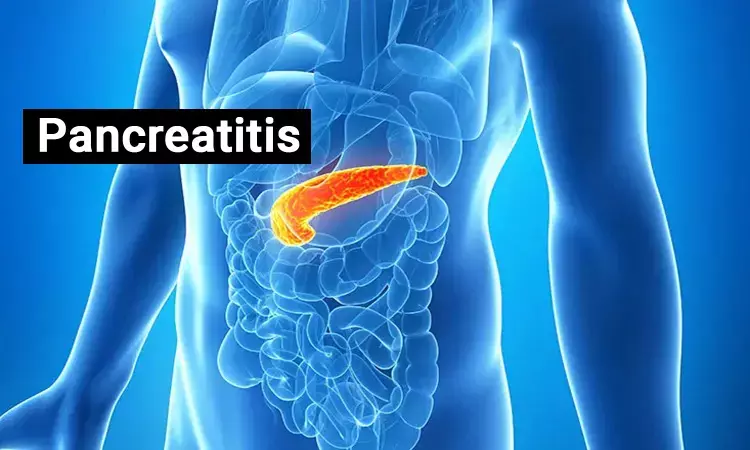- Home
- Medical news & Guidelines
- Anesthesiology
- Cardiology and CTVS
- Critical Care
- Dentistry
- Dermatology
- Diabetes and Endocrinology
- ENT
- Gastroenterology
- Medicine
- Nephrology
- Neurology
- Obstretics-Gynaecology
- Oncology
- Ophthalmology
- Orthopaedics
- Pediatrics-Neonatology
- Psychiatry
- Pulmonology
- Radiology
- Surgery
- Urology
- Laboratory Medicine
- Diet
- Nursing
- Paramedical
- Physiotherapy
- Health news
- Fact Check
- Bone Health Fact Check
- Brain Health Fact Check
- Cancer Related Fact Check
- Child Care Fact Check
- Dental and oral health fact check
- Diabetes and metabolic health fact check
- Diet and Nutrition Fact Check
- Eye and ENT Care Fact Check
- Fitness fact check
- Gut health fact check
- Heart health fact check
- Kidney health fact check
- Medical education fact check
- Men's health fact check
- Respiratory fact check
- Skin and hair care fact check
- Vaccine and Immunization fact check
- Women's health fact check
- AYUSH
- State News
- Andaman and Nicobar Islands
- Andhra Pradesh
- Arunachal Pradesh
- Assam
- Bihar
- Chandigarh
- Chattisgarh
- Dadra and Nagar Haveli
- Daman and Diu
- Delhi
- Goa
- Gujarat
- Haryana
- Himachal Pradesh
- Jammu & Kashmir
- Jharkhand
- Karnataka
- Kerala
- Ladakh
- Lakshadweep
- Madhya Pradesh
- Maharashtra
- Manipur
- Meghalaya
- Mizoram
- Nagaland
- Odisha
- Puducherry
- Punjab
- Rajasthan
- Sikkim
- Tamil Nadu
- Telangana
- Tripura
- Uttar Pradesh
- Uttrakhand
- West Bengal
- Medical Education
- Industry
Methylnaltrexone Shows No Superiority in Reducing Acute Pancreatitis Severity: Study

Researchers have found that methylnaltrexone, a peripherally acting µ-opioid receptor antagonist, does not offer a significant advantage over placebo in reducing the severity of acute pancreatitis (AP). A recent study was published in The American Journal of Gastroenterology by Knoph C. and colleagues.
Opioids are among the most common drugs administered to alleviate severe pain in a patient with acute pancreatitis. However, this raises concerns regarding whether opioids actually exacerbate the condition by impairing gastrointestinal and immune functions. Therefore, the authors postulated that methylnaltrexone would oppose such adverse effects attributed to peripheral opioid receptors, without attenuating the analgesic function. The study was aimed at determining whether methylnaltrexone would reduce AP severity in patients who also had systemic inflammatory response syndrome.
This was a double-blind, randomized, placebo-controlled trial conducted in adult patients with AP at four Danish centers. Patients were randomized to receive continuous intravenous methylnaltrexone, 0.15 mg/kg/d, or placebo for five days, in addition to standard care. The change in the Pancreatitis Activity Scoring System score after 48 hours of treatment was the primary endpoint measured. Secondary endpoints included pain scores, use of opioids, severity of disease, and mortality rates.
The key findings of the study were:
• A total of 105 patients were randomized into two groups: 51 received methylnaltrexone, and 54 received a placebo.
• After 48 hours, the Pancreatitis Activity Scoring System score was 134.3 points for the methylnaltrexone group and 130.5 points for the placebo group (difference of 3.8 points; 95% confidence interval [CI], −40.1 to 47.6; P = 0.87).
• No significant differences were found between the groups in terms of pain severity (0.0; 95% CI, −0.8 to 0.9; P = 0.94), pain interference (−0.3; 95% CI, −1.4 to 0.8; P = 0.55), and morphine equivalent doses (6.5 mg; 95% CI, −2.1 to 15.2; P = 0.14).
• Methylnaltrexone did not significantly impact the risk of severe disease (8%; 95% CI, −11 to 28; P = 0.38) or mortality (6%; 95% CI, −1 to 12; P = 0.11).
• The medication was well tolerated, with no major adverse effects reported.
The results of this study indicate that methylnaltrexone does not provide a significant benefit over placebo in reducing the severity of acute pancreatitis. Despite its theoretical advantages in mitigating opioid-induced gastrointestinal and immune dysfunctions, methylnaltrexone did not demonstrate superiority in clinical outcomes for AP patients.
Methylnaltrexone treatment did not achieve superiority over placebo in reducing the severity of acute pancreatitis. These results underscore the importance of further investigation into alternative therapies for pain management in AP patients to improve clinical outcomes without adverse effects.
Reference:
Knoph, C. S., Cook, M. E., Novovic, S., Hansen, M. B., Mortensen, M. B., Nielsen, L. B. J., Høgsberg, I. M., Salomon, C., Neergaard, C. E. L., Aajwad, A. J., Pandanaboyana, S., Sørensen, L. S., Thorlacius-Ussing, O., Frøkjær, J. B., Olesen, S. S., & Drewes, A. M. (2024). No effect of methylnaltrexone on acute pancreatitis severity: A multicenter randomized controlled trial. The American Journal of Gastroenterology, 10.14309/ajg.0000000000002904. https://doi.org/10.14309/ajg.0000000000002904
Dr Riya Dave has completed dentistry from Gujarat University in 2022. She is a dentist and accomplished medical and scientific writer known for her commitment to bridging the gap between clinical expertise and accessible healthcare information. She has been actively involved in writing blogs related to health and wellness.
Dr Kamal Kant Kohli-MBBS, DTCD- a chest specialist with more than 30 years of practice and a flair for writing clinical articles, Dr Kamal Kant Kohli joined Medical Dialogues as a Chief Editor of Medical News. Besides writing articles, as an editor, he proofreads and verifies all the medical content published on Medical Dialogues including those coming from journals, studies,medical conferences,guidelines etc. Email: drkohli@medicaldialogues.in. Contact no. 011-43720751


